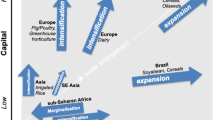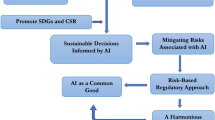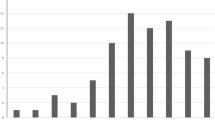Abstract
This paper presents the idea of a decision-support system for a livestock farm, called “ethical accounting”, to be used as an extension of traditional cost accounting. “Ethical accounting” seeks to make available to the farmer information about how his decisions affect the interests of farm animals, consumers and future generations. Furthermore, “ethical accounting” involves value-based planning. Thus, the farmer should base his choice of production plan on reflections as to his fundamental objectives, and he should make his final decision only after having seriously considered the various consequences for the affected parties.
Similar content being viewed by others
REFERENCES
Ackoff, R. L., Creating the Corporate Future (New York: John Wiley, 1982).
Agger, J. F. and P. Willeberg, “Production and Mortality in Dairy Cows from 1960-1991: Time Series Analysis of Ecological Data,” Proc. 6. ISVEE. Symp. (Ottawa, 1991), pp. 357-360.
Barry, B., “Intergenerational Justice in Energy Policy,” in D. MacLean and P. G. Brown (eds.), Energy and the Future (Totowa, N.J.: Rowman and Littlefield, 1983).
Bennett, J., “Two Departures from Consequentialism,” Ethics 100 (1989), 54-66.
Bogetoft, P. and P. Pruzan, Planning with Multiple Criteria. Investigation, Communication, Choice (Amsterdam: North Holland, 1991).
Broome, J., Weighing Goods. Equality, Uncertainty and Time (Oxford: Basil Blackwell, 1991).
Broome, J., Counting the Cost of Global Warming. A Report to the Economic and Social Research Council on Research by John Broome and David Ulph (Cambridge: TheWhite Horse Press, 1992).
Callicott, J. B., “Animal Liberation: A Triangular Affair,” Environmental Ethics 2 (1980), 311-338.
Demski, J., Managerial Uses of Accounting Information (Dordrecht: Kluwer, 1994).
Elliott, R. E., “Faking Nature,” Inquiry 25 (1982), 81-93.
Freeman, E. R., Strategic Management. A Stakeholder Approach (Marshfield, Mass.: Pitman, 1984).
Goodpaster, K. E., “On Being Morally Considerable,” Journal of Philosophy 78 (1978), 308-325.
Griffin, J., Well-Being. Its Meaning, Measurement and Moral Importance (Oxford: Clarendon Press, 1986).
Halberg, N., E. S. Kristensen and I. S. Kristensen, “Nitrogen Turnover on Organic and Coventional Mixed Farms,” Journal of Agricultural and Environmental Ethics 8-1 (1995), 30-51.
Jensen, K. K., “The Trade-off between Animal Welfare and Human Interests,” Acta Agric. Scand., Sect. A, Animal Sci. Suppl. 27 (1996), 104-108.
Keeney, R. L., Value-Focused Thinking. A Path to Creative Decisionmaking (Cambridge, Mass.: Harvard University Press, 1992).
Keeney, R. L. and H. Raiffa, Decisions with Multiple Objectives. Preferences and Value Tradeoffs (New York: John Wiley, 1976).
Nozick, R., Anarchy, State and Utopia (Basic Books, 1974).
O'Neill, J., Ecology, Policy and Politics. Human Well-Being and the Natural World(London: Routledge, 1993).
Parfit, D., Reasons and Persons (Oxford: Clarendon Press, 1984).
Pruzan, P. and O. Thyssen, “Conflict and Consensus. Ethics as a Shared Value Horizon for Strategic Planning,” Human Systems Management 9 (1990), 135-151.
Rachels, J., The Elements of Moral Philosophy, Second Edition (New York: McGraw-Hill, 1993).
Rawls, J., A Theory of Justice (Oxford University Press, 1972).
Regan, T., The Case for Animal Rights (London: Routledge, 1984).
Rollin, B. E., Animal Rights and Human Morality (New York: Prometheus, 1981).
Rolston, H. III, Environmental Ethics. Duties to and Values in the Natural World (Philadelphia: Temple University Press, 1988).
Sandøe, P. and F. Hurnik (eds.), Welfare of Domestic Animals. Concepts, Theories, and Methods of Measurement. Acta Agric. Scand., Sect. A, Animal Sci. Suppl. 27 (1996).
Sandøe, P., L. Munksgaard, N. P. Bådsgård and K. H. Jensen, “How to Manage the Management Factor - Assessing Animal Welfare at the Farm Level,” in J. T. Sørensen (ed.), Livestock Farming Systems, More than Food Production, EAAP Publication No 89, 1997, pp. 221-230.
Scheffler, S., The Rejection of Consequentialism, Revised Edition (Oxford: Clarendon Press, 1994).
Singer, P., Animal Liberation (Wellington, Northamptonshire: Thorsons Publishers Ltd., 1976).
Taylor, P., Respect for Nature. A Theory of Environmental Ethics (Princeton University Press, 1986).
Vallentyne, P., “The Teleological/Deontological Distinction,” Journal of Value Inquiry 21 (1987), 21-32.
Vallentyne, P., “Gimmicky Representations of Moral Theories,” Metaphilosophy 19 (1988), 253-263.
Van der Ploeg, J. D., “Rural Sociology and the new Agrarian Question. A Perspective from the Netherlands,” Sociologia Ruralis 33-32 (1993), 240-260.
Varian, H. R., Microeconomic Analysis, Third Edition (New York: W. W. Norton, 1992).
Williams, B., “A Critique of Utilitarianism,” in J. J. C. Smart and B. Williams (eds.), Utilitarianism: For and Against (Cambridge University Press, 1973), pp. 75-150.
de Wit, C. T., H. Huisman and R. Rabbinge, “Agriculture and its Environment: Are There Other Ways?,” Agricultural Systems 23 (1987), 211-236.
Author information
Authors and Affiliations
Rights and permissions
About this article
Cite this article
Jensen, K.K., Sørensen, J.T. The Idea of “Ethical Accounting” for a Livestock Farm. Journal of Agricultural and Environmental Ethics 11, 85–100 (1998). https://doi.org/10.1023/A:1009519131191
Issue Date:
DOI: https://doi.org/10.1023/A:1009519131191




